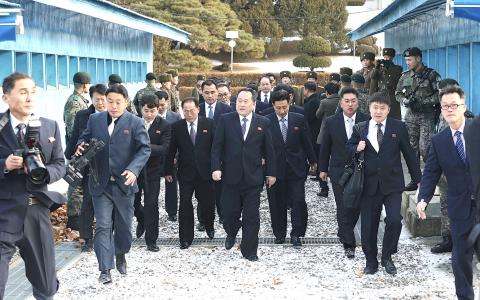North Korea is to send its athletes to the Winter Olympics in the South next month, the rivals said yesterday after their first formal talks in more than two years.
The two sides also decided to hold military talks to ease tensions and to restore a military hotline closed since February 2016.
Seoul and Olympic organizers have been keen for Pyongyang — which boycotted the 1988 Seoul Summer Games — to take part in what they repeatedly proclaimed a “peace Olympics” in Pyeongchang.

Photo: AP / Yonhap
“The North Korean side will dispatch a National Olympic Committee delegation, athletes, cheerleaders, art performers’ squad, spectators, a taekwondo demonstration team and a press corps, and the South will provide necessary amenities and facilities,” they said in a joint statement.
Yesterday’s talks were held in Panmunjom, the truce village in the Demilitarized Zone.
The North’s delegation walked over the Military Demarcation Line marking the border to the Peace House venue on the southern side, just meters from where a defector ran across in a hail of bullets two months ago.
Looking businesslike, the South Korean Minister of Unification Cho Myoung-gyon and the North’s chief delegate, Ri Son-gwon, shook hands at the entrance to the building and again across the negotiating table.
“Let’s present the people with a precious new year’s gift,” Ri said. “There is a saying that a journey taken by two lasts longer than the one traveled alone.”
The atmosphere was friendlier than at past meetings, and Cho told Ri: “The people have a strong desire to see the North and South move toward peace and reconciliation.”
However, there was no mention in the joint statement of a proposal by Seoul to resume reunions of families left divided by the Korean War, or of an offer by the North to send a high-level delegation to the Games.
Only two athletes from the North have qualified for the Games so far, but hundreds of young female North Korean cheerleaders have created a buzz at three previous international sporting events in the South.
The group might stay on a cruise ship in Sokcho, about an hour’s drive from the Olympic venue.
According to South Korean reports, any high-level delegation accompanying the team could include North Korean leader Kim Jong-un’s younger sister, Yo-jong, who is a senior member of the ruling Workers’ Party.
Both sides expressed the desire to address wider questions, but Pyongyang has snubbed previous attempts by Seoul to set up further family reunions, saying it would not do so unless several of its citizens are returned by the South.
“The South and the North agreed to activate cross-border contacts, passages, exchanges and cooperation, and to seek national reconciliation and unity in various sectors,” the statement said, without giving details.
It was unclear when the proposed military talks — which would be the first of their kind since 2014 — would be held.
“The two sides will reach a smooth agreement on Pyeongchang, but what happens afterward?” Dongguk University professor Koh Yu-hwan said before the announcement. “In terms of pending issues regarding the improvement of inter-Korean ties, it won’t be easy to immediately reach an agreement.”

Auckland rang in 2026 with a downtown fireworks display launched from New Zealand’s tallest structure, Sky Tower, making it the first major city to greet the new year at a celebration dampened by rain, while crowds in Taipei braved the elements to watch Taipei 101’s display. South Pacific countries are the first to bid farewell to 2025. Clocks struck midnight in Auckland, with a population of 1.7 million, 18 hours before the famous ball was to drop in New York’s Times Square. The five-minute display involved 3,500 fireworks launched from the 240m Sky Tower. Smaller community events were canceled across New Zealand’s

The Ministry of Foreign Affairs (MOFA) yesterday said it is closely monitoring developments in Venezuela, and would continue to cooperate with democratic allies and work together for regional and global security, stability, and prosperity. The remarks came after the US on Saturday launched a series of airstrikes in Venezuela and kidnapped Venezuelan President Nicolas Maduro, who was later flown to New York along with his wife. The pair face US charges related to drug trafficking and alleged cooperation with gangs designated as terrorist organizations. Maduro has denied the allegations. The ministry said that it is closely monitoring the political and economic situation

‘SLICING METHOD’: In the event of a blockade, the China Coast Guard would intercept Taiwanese ships while its navy would seek to deter foreign intervention China’s military drills around Taiwan this week signaled potential strategies to cut the nation off from energy supplies and foreign military assistance, a US think tank report said. The Chinese People’s Liberation Army (PLA) conducted what it called “Justice Mission 2025” exercises from Monday to Tuesday in five maritime zones and airspace around Taiwan, calling them a warning to “Taiwanese independence” forces. In a report released on Wednesday, the Institute for the Study of War said the exercises effectively simulated blocking shipping routes to major port cities, including Kaohsiung, Keelung and Hualien. Taiwan would be highly vulnerable under such a blockade, because it

UNRELENTING: China attempted cyberattacks on Taiwan’s critical infrastructure 2.63 million times per day last year, up from 1.23 million in 2023, the NSB said China’s cyberarmy has long engaged in cyberattacks against Taiwan’s critical infrastructure, employing diverse and evolving tactics, the National Security Bureau (NSB) said yesterday, adding that cyberattacks on critical energy infrastructure last year increased 10-fold compared with the previous year. The NSB yesterday released a report titled Analysis on China’s Cyber Threats to Taiwan’s Critical Infrastructure in 2025, outlining the number of cyberattacks, major tactics and hacker groups. Taiwan’s national intelligence community identified a large number of cybersecurity incidents last year, the bureau said in a statement. China’s cyberarmy last year launched an average of 2.63 million intrusion attempts per day targeting Taiwan’s critical